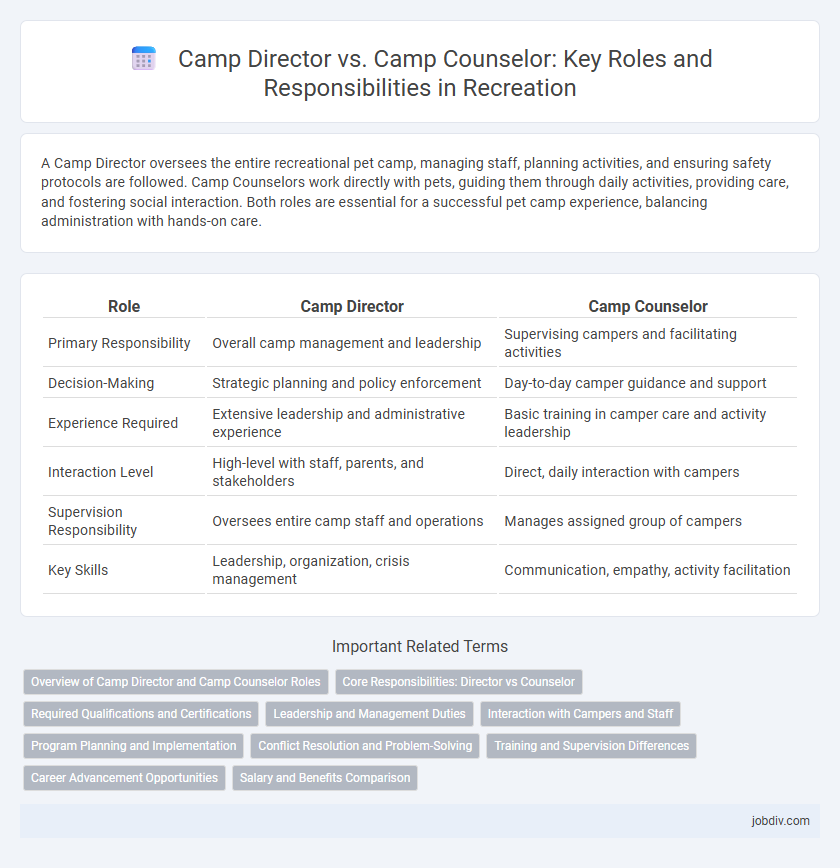A Camp Director oversees the entire recreational pet camp, managing staff, planning activities, and ensuring safety protocols are followed. Camp Counselors work directly with pets, guiding them through daily activities, providing care, and fostering social interaction. Both roles are essential for a successful pet camp experience, balancing administration with hands-on care.
Table of Comparison
| Role | Camp Director | Camp Counselor |
|---|---|---|
| Primary Responsibility | Overall camp management and leadership | Supervising campers and facilitating activities |
| Decision-Making | Strategic planning and policy enforcement | Day-to-day camper guidance and support |
| Experience Required | Extensive leadership and administrative experience | Basic training in camper care and activity leadership |
| Interaction Level | High-level with staff, parents, and stakeholders | Direct, daily interaction with campers |
| Supervision Responsibility | Oversees entire camp staff and operations | Manages assigned group of campers |
| Key Skills | Leadership, organization, crisis management | Communication, empathy, activity facilitation |
Overview of Camp Director and Camp Counselor Roles
Camp directors oversee the entire camp operation, managing staff, budgets, and programming to ensure a safe and engaging experience for all participants. Camp counselors work directly with campers, facilitating activities, providing supervision, and fostering a supportive environment. Both roles are essential for successful camp management, but camp directors focus on leadership and administration, while camp counselors emphasize camper interaction and guidance.
Core Responsibilities: Director vs Counselor
The Camp Director oversees overall camp operations, including staff management, program planning, and safety compliance, ensuring a seamless experience for campers. In contrast, the Camp Counselor focuses on direct camper engagement, facilitating activities, providing mentorship, and maintaining a safe, supportive environment. Both roles are essential, with the Director emphasizing leadership and administration, while the Counselor prioritizes hands-on camper interaction and support.
Required Qualifications and Certifications
Camp Directors typically require a bachelor's degree in recreation management, education, or a related field, along with several years of leadership experience. They must hold certifications in first aid, CPR, and often have specialized training in child safety and emergency management. Camp Counselors generally need a high school diploma or equivalent, basic first aid and CPR certification, and strong interpersonal skills to effectively supervise and engage campers.
Leadership and Management Duties
Camp directors oversee overall camp operations, strategic planning, and staff coordination, ensuring safety protocols and program quality. Camp counselors focus on daily camper supervision, activity facilitation, and fostering a positive group environment. Effective leadership by directors drives camp success, while counselors provide hands-on management of camper experiences.
Interaction with Campers and Staff
Camp directors oversee overall camp operations, fostering leadership and decision-making to create a safe and engaging environment for campers and staff. Camp counselors engage directly with campers, facilitating activities, providing support, and building personal relationships to enhance camper experience and development. Strong communication skills and teamwork are essential for both roles to ensure smooth interaction and a positive camp community.
Program Planning and Implementation
Camp directors oversee comprehensive program planning, ensuring activities align with safety standards, educational goals, and camper engagement. Camp counselors implement these plans by leading daily activities, adapting to camper needs, and fostering a positive environment. Effective collaboration between directors and counselors is essential for seamless execution of camp programs.
Conflict Resolution and Problem-Solving
Camp directors provide strategic oversight for conflict resolution by establishing clear policies and training frameworks, ensuring counselors are equipped to handle disputes effectively. Camp counselors engage directly with campers, applying problem-solving techniques to mediate conflicts in real time and foster a positive group environment. Both roles complement each other, with directors focusing on systemic solutions and counselors managing immediate interpersonal issues.
Training and Supervision Differences
Camp directors undergo extensive leadership training focused on program development, staff management, and regulatory compliance, ensuring overall camp safety and quality. Camp counselors receive targeted training centered on child supervision, activity facilitation, and emergency response to support daily camper engagement. The camp director supervises counselors through continuous evaluation and mentorship, fostering staff development and maintaining operational standards.
Career Advancement Opportunities
Camp Directors often have greater career advancement opportunities than Camp Counselors due to their leadership role, responsibility for overall camp operations, and involvement in strategic planning. Camp Counselors typically gain valuable hands-on experience and people skills, which can serve as foundational steps toward becoming Camp Directors or pursuing other management roles in recreation. Progression from counselor to director often requires additional certifications, administrative skills, and proven leadership capabilities.
Salary and Benefits Comparison
Camp Directors typically earn between $45,000 and $70,000 annually, reflecting their leadership responsibilities and extensive experience in camp management. Camp Counselors usually receive seasonal wages ranging from $2,500 to $5,000 per summer, with benefits often limited to housing and meals rather than monetary compensation. Directors tend to have access to comprehensive benefits packages including health insurance, retirement plans, and performance bonuses, whereas counselors primarily receive non-monetary perks designed for temporary employment periods.
Camp Director vs Camp Counselor Infographic

 jobdiv.com
jobdiv.com